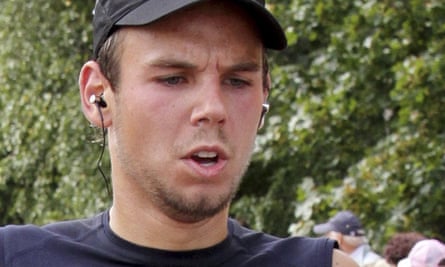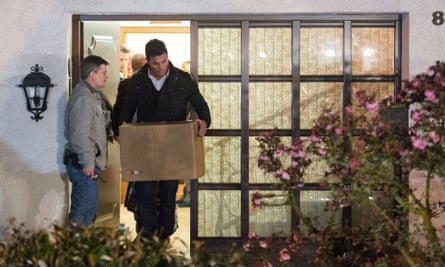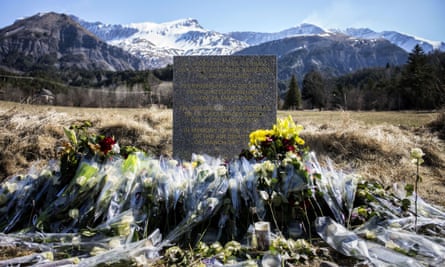The co-pilot on the Germanwings flight that crashed in the French Alps wanted to do “do something” history would remember him by, according to reports.
Andreas Lubitz, 27, had hidden a sicknote declaring him unfit to work on the day of the disaster before boarding the Düsseldorf-bound Airbus A320 and flying it into a mountain in the southern French Alps, killing all 150 people on board.
According to the German newspaper Bild, a former girlfriend of Lubitz, identified only as Mary W, said he had told her last year: “One day I will do something that will change the whole system, and then all will know my name and remember it.”
She added: “I never knew what he meant, but now it makes sense.”
And the flight attendant, 26, said the pilot, who took a break in his training due to reported “burnout syndrome”, had suffered nightmares and his behaviour had scared her.
She told the paper: “At night, he woke up and screamed: ‘We’re going down!’, because he had nightmares. He knew how to hide from other people what was really going on inside.”
As legal experts warned that the airline’s parent company, Lufthansa, could face compensation claims for hundreds of millions of dollars, Düsseldorf prosecutors said they had found the torn-up doctor’s note covering the day of the disaster – Tuesday 24 March.
“Medical documents were found that indicate an ongoing illness and appropriate medical treatment,” the statement said. “The circumstance that torn-up current medical certificates – also pertaining to the day of the act – were found, supports, after preliminary examination, the assumption that the deceased hid his illness from his employer and his professional circles.”
No suicide note or claim of responsibility had been found, the prosecutors said.
Legal experts said that on the evidence that has emerged so far – which suggests the co-pilot may have had a history of depression and psychiatric problems – the airline would find it difficult to prove that the crash was not its fault.
“To avoid paying unlimited compensation, they have to show the crash was not due to negligence, omission or a wrongful act either by them or by their servants or agents,” said Clive Garner, the head of aviation law at Irwin Mitchell, which has represented passengers’ families in similar cases.
“We should be cautious, of course. But in reality, based on what we know at this point, they are not going to be able to establish that. Whether it was a deliberate act or negligence, they’re going to be liable for a large sum of money.”
Garner said the sums involved could be substantial. “It depends on the families’ circumstances – how much the passenger earned, how many dependants there are,” he said. “But seven-figure claims per family are by no means unusual.”
Germanwings said later that it had not been aware of Lubitz’s sicknote. “Germanwings would like to clarify that no medical note was presented to the firm for this day,” it said in a statement.
The investigation into the crash has turned to Lubitz’s background after the disclosure by French prosecutors on Thursday that he appeared to have deliberately downed the plane in a rocky ravine.
Investigators are looking for clues as to why Lubitz may have wanted to take his own life – and to kill 149 other people as he did so.
Dr Hans-Werner Teichmüller, president of the Deutsche Fliegerarztverband, an association of German doctors who carry out examinations on pilots and flight crew, expressed shock at the co-pilot’s alleged actions.
“It’s horrible, it’s becoming more and more incomprehensible,” Teichmüller said. “It’s utterly irresponsible that he flew even though he had a certificate saying he was not ready to work, and was therefore unfit to fly. Everything he did was highly criminal.”
On Thursday, Lufthansa’s chief executive, Carsten Spohr, revealed that Lubitz had interrupted his training in 2009, but refused to say why. He would only say that Lubitz had eventually been cleared to return to work, after passing fitness and psychological tests.
On Friday, the German newspaper Bild said the Lufthansa flight school in Phoenix, Arizona, had designated Lubitz at the time as “not suitable for flying”.

The newspaper said he spent 18 months receiving psychiatric treatment. He was forced to repeat his flying classes several times because of depression, before he successfully finished his training. In 2009 he was diagnosed with a “severe depressive episode”, Bild reported. Süddeutsche Zeitung said the sicknote in question was written by a psychiatrist in Rhineland.
Germany’s federal aviation office (LBA), which administers pilots’ licences, has reportedly asked Lufthansa for Lubitz’s files, and said it would pass them on to the French investigators.
“Anyone with a licence must report to an approved aviation doctor once a year and receive a suitability certificate,” a spokesman told the NTV news channel.
An LBA spokesman said the widely reported “special regular medical examination” (SIC) mark on Lubitz’s file could pertain to any medical problem.

Citing police sources, Bild said the investigation was examining whether Lubitz had been suffering from a “personal life crisis”. He is said to have had relationship problems with his girlfriend and to have suffered emotional problems. The local Westerwälder newspaper said Lubitz and his girlfriend had been together for seven years and lived in a flat in Düsseldorf.
Lufthansa has yet to respond to the claims. Bild, Germany’s best-selling newspaper, is normally – though not always – a reliable source of news, and has an extensive network of sources.
The crash is a major blow to the highly respected carrier and its low-cost but equally well-regarded subsidiary, both of which have formidable safety records. The company’s last fatal accident was more than 20 years ago, and it had recorded nine flight-related deaths in 40 years.
Lufthansa has struggled recently against stiff competition from budget airlines such as Ryanair and easyJet on its European routes, and rivals such as Emirates and Turkish on long-haul flights. Two years ago it announced plans to shed 3,500 jobs as part of a cost-cutting and restructuring exercise that has brought it into fierce conflict with pilots and other staff.
International conventions, including the Montreal convention of 1999, mean it is difficult for an airline to escape responsibility for passenger deaths, and the rules set a “strict liability” in the event of a crash at about £105,000 per victim. But families can and often do submit compensation claims, including for suffering and loss of support, in excess of that sum. Most were settled out of court, Garner said.
Calls for more exhaustive psychological testing of airline pilots intensified as it became clear that few national aviation authorities require formal psychometric testing once aircrew have qualified.
While almost all pilots undergo a full medical examination once or twice a year, most of it is physiological: height, weight, heart, blood, urine, eyesight. Technical ability is tested on a simulator.
The psychological component of most airline medicals consists of a few “general questions” about aircrews’ mood, family relations, sleep patterns and alcohol use, and whether they have suffered any recent episodes of depression or suicidal feelings.
Doctors can order formal psychological tests if they think they are necessary, however, and pilots are expected to report any mental health issues they experience themselves or observe in colleagues.
Industry experts doubted that more intensive and frequent tests would be effective in 100% of cases, arguing that the“rule of two”, which requires two qualified air crew to be in the cockpit at all times, might ultimately be a better guarantee of safety.
“A pilot that intends to do something like this could be skilful enough to pass as a well-structured person, even if they were in danger of suicide,” Teichmüller said. “Even with an examination process you wouldn’t have 100% safety.”
In France, Patrick Touron, deputy director of the criminal research institute at the national gendarmerie, gave a press conference near the crash zone on Friday.
“We have sent out an urgent medical-legal team to start identification and we have a team working on the site to recuperate the bodies, parts of bodies or biological matter, depending on the circumstances, so we can proceed with the identification of the victims,” Touron said.
“The air disaster was so devastating that we have not found a single body intact. We have found parts of bodies and biological matter that are currently undergoing postmortem examinations.”
On Thursday, prosecutors in France gave details of the final moments of flight 4U9525, travelling from Barcelona to Düsseldorf. For eight minutes, during which the cockpit voice recorder revealed Lubitz said nothing but was breathing normally, he ignored the captain, Patrick Sonderheimer, who was hammering on the cockpit door, and did not respond to increasingly urgent radio calls from air traffic controllers and nearby aircraft.
Emergency codes allow crew to enter an aircraft cockpit in the event of an incapacitated pilot, but the co-pilot is thought to have intentionally overridden the system, which is a post-11 September 2001 security measure intended to prevent hijack.
“It could only have been deliberate,” said the French prosecutor Brice Robin, who gave the chilling account of the flight’s final 10 minutes. “He did this for a reason we do not know … but it can be seen as a willingness to destroy the aircraft.”
The only comfort that Robin could offer grieving families was that the passengers appear to have been unaware of their impending deaths until the last few seconds. They and the six crew members, including Lubitz, were killed instantly when the plane hit the ground and exploded.
“I think victims only realised at the last minute, at the very last minute … there were screams at the last moment just before the impact,” Robin said.

It appears that Lubitz took advantage of being alone in the cockpit to initiate the dive that ended in the crash. In response, several air carriers said they would implement the rule of two to avoid a pilot being left alone on the flight deck.
German airlines introduced the rule with immediate effect on Friday. The German Aviation Association (BDL), which represents the airline industry, released a statement saying that the airlines had voluntarily agreed to introduce the rule “following the tragic accident in France”.
Two authorised members of the flight crew must now be in the cockpit at all times. The BDL’s statement said the measure had been taken in coordination with the German transport ministry and the federal aviation office.
Airlines in Europe are not required to have two people in the cockpit at all times, unlike the standard US operating procedure, which was changed after the 11 September 2001 attacks to require a flight attendant to take the spot of a briefly absent pilot.
easyJet was the first airline in the UK to announce it would implement the rule from Friday. “The safety and security of its passengers and crew is the airline’s highest priority,” a spokesperson said.
Some experts said even two was not enough, and called for rules to require three. “The flight deck is capable of accommodating three pilots and there shouldn’t ever be a situation where there is only one person in the cockpit,” said James Hall, a former chairman of the US National Transportation Safety Board.
Others questioned the wisdom of sealing off the cockpit at all. “The kneejerk reaction to the events of 9/11 with the ill-thought reinforced cockpit door has had catastrophic consequences,” said Philip Baum, the London-based editor of the trade magazine Aviation Security International.